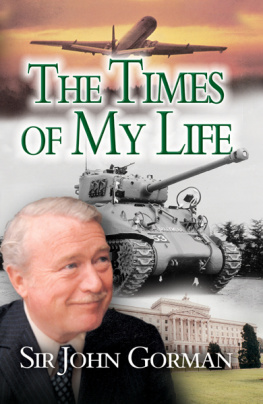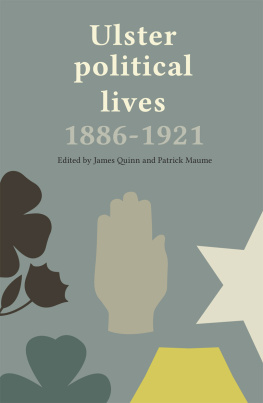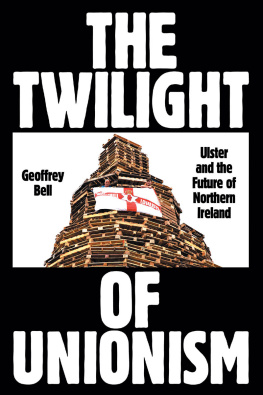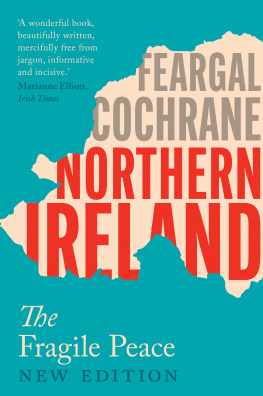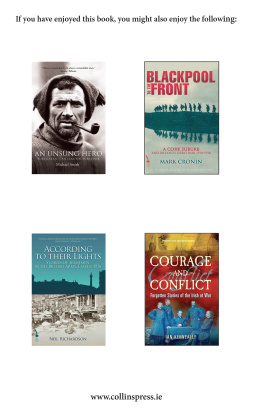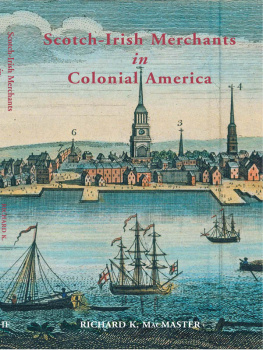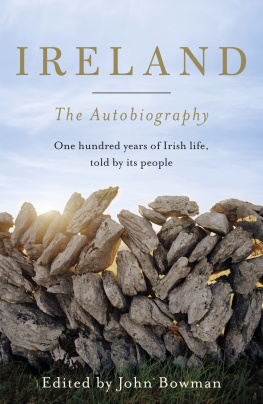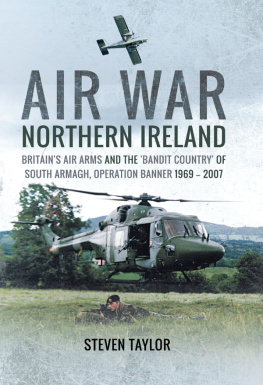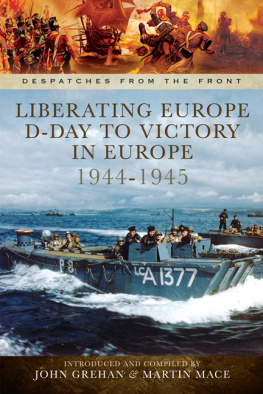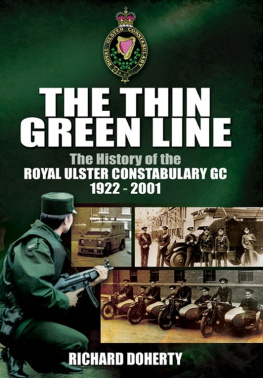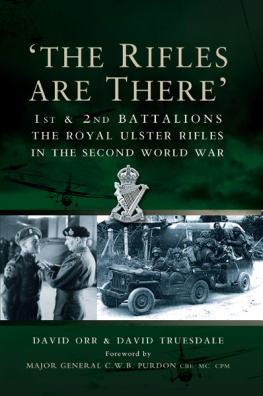First Published in Great Britain 2002 by
LEO COOPER
an imprint of Pen & Sword Books
47 Church Street
Barnsley, S. Yorkshire, S70 2AS
Copyright 2002 John Gorman
ISBN 0 0 85052 906 9
PRINT ISBN: 9780850529067
PDF ISBN: 9781783377442
EPUB ISBN: 9781783377435
PRC ISBN: 9781783379248
A CIP record for this book is available from the British Library
Typeset in 10/12.5pt Plantin by
Phoenix Typesetting, Burley-in-Wharfedale, West Yorkshire.
CONTENTS
INTRODUCTION
In another century John Gorman might have been the model for Franz Hals Laughing Cavalier; in this one he is something of a survival for the qualities of honour and honesty, loyalty to the church and the regiment, and old-world charm and courtliness.
His story, told with a simple innocence, captures the spirit of the man, his humanity and kindliness, and recounts the major events of a incidentpacked life with a disarming air of modesty and self-deprecation.
Sir John was a hero at twenty-one, awarded the Military Cross for disabling a German Super-Tiger tank on the battlefield of Normandy by the simple, if courageous, expedient of ramming it broadside with a smaller tank. When we think of men in armour and the casques which did affright the air at Agincourt, we forget that in these and other wars, arms were borne heroically by boys, forced by circumstances to become men before their time. Some, through death, never became men. Some who survived remained as boys, the experience of war their greatest hour.
John Gorman was one of those who took the war in his stride, learned from it a painful rite of passage and went on to live out a full and varied life but still a life of service. The qualities which had made him a good officer a clear view of what he was fighting for, a belief in its rightness, respect for the terrain, loyalty to the corps and an enduring respect for and care of his men, remained with him for life and made him the good manager that he is.
This book, however, is about more than management, it is about family and friendship. In a way, though, one theme suffuses and illuminates the other. The influence of a father, spartan perhaps but committed to police service, and a mother with deep religious conviction with a medical background, shine through, and John manages to combine the two. In son, as in father, there is the sense of public service, the tension between religion, culture and duty, the conflict of loyalties so clearly portrayed by Sebastian Barry in the character of another policeman in The Steward of Christendom. One is struck by the essential humanity and common-sense with which he discharges the role of policeman in Northern Ireland, and the equanimity and total lack of bitterness with which he faced the fact that as a Roman Catholic his prospects were severely limited.
As Director of the Northern Ireland Housing Executive, he returned to Northern Ireland and to a life of public service, but he brought to it all the skills which he had acquired in the meantime. Housing shortage, location and discrimination in allocation, had been a burning issue for decades, the one single issue which had brought people out on to the streets in protest. The Housing Executive depoliticized housing, raised standards and professionalized housing administration. To have led such an organization through a period of fundamental change, to have combined staffs from many backgrounds and to have supplied the vision and the drive which would unite them in a common purpose would have been enough for most men, but not for John Gorman.
After that there was the Institute of Directors, and after that the entry into politics as one of the few Catholic members of the Ulster Unionist Party, and that rare bird indeed, a Unionist Assembly Member who was a Catholic. In this as in his other incarnations, John Gorman has been an agent for change, with perhaps less of the aggressiveness which toppled the Tiger tank, but with no less courage and exuberance. He brought a new civility into the political discourse, an ability to listen to the other person and to afford respect, and a willingness to act as a bridge between classes, traditions and cultures.
In all his life, private and public, Johns religious faith has been very important to him and has pervaded and guided his life and actions. He remains a family man, the quintessentially good officer, loyal to the regiment, respectful of tradition and caring for his men. His spirit remains undaunted, a tank officer who was a cavalryman (or a cavalier) at heart. He might have been at Agincourt with Harry, he should have ridden with the Light Brigade at Balaclava.
Oddly enough, I think he would have survived both, with a good story to tell!
I never now drive past Caen without looking for a signpost to Cagny and thinking of John Gorman. I have found him, however, in many other settings, as I hope many, many readers will find him in this, his own account of himself.
Maurice Hayes
October 2002
Chapter One
FAMILY AND SCHOOL
A trench-coated figure knocked on the gates of the Phoenix Park Depot Royal Irish Constabulary. It was Michael Collins, Minister of Home Affairs of the new Free State Government which he had negotiated with Lloyd George, the British Prime Minister, through the Irish Treaty of 1920.
The Adjutant of the RIC Depot, my father, Major J.K. Gorman MC, rode across the square to meet him, dismounted and symbolically handed over the key of this bastion of Britain in Ireland. The Depot was part of Robert Peels plan for Ireland, which envisaged a national police controlled from Dublin, employing a Constabulary trained and disciplined through a military-type Depot. Two weeks later the British Army handed it over.
My father, John also, usually known as Jack, except in his close family where he was Johnny, was born in 1890. The Gormans owned a substantial farm, Gurtishall (sometimes aggrandized to Gurtis Hall), near the village of Ballyporeen, Co. Tipperary. He was the eldest of six children of Patrick Gorman and Kathleen from Scotland. He had a happy childhood, was clearly bright, outgoing and athletic and was much favoured by his uncle, also John, who was Chief of Customs in Dublin. Uncle John put him down for Blackrock, a leading Irish public school, and contributed substantially to the cost of this. He did well at Blackrock, was head of his house and played rugger and cricket for the school. Appointed Personal Assistant to the President of Argentine Railways, he sailed for Buenos Aires in 1908. This swift appointment of an 18-year-old no doubt owed much to the benevolent Uncle John. Life in South America for a young Irishman at that time was exciting, and the charm and good humour which characterized him made him a popular figure, besides which he clearly excelled in the post, despite his youth and lack of knowledge of the railway business. There was an Officers Training Corps in the substantial British community which he joined without hesitation, as there was, and is, a strong British Army tradition in the Gorman family. One legend concerns a Peggy Gorman who was a drummer in the 87th Regiment and lost his leg at the battle of Barossa, fighting for Wellington. Despite having only one leg (thus Peggy) he remained with the 87th. On return to Tipperary, he fathered a large family, and his sons and grandsons served in the Army, which at that time had a very large Irish Catholic contingent, over 50%.
Jacks carefree existence in Argentina came to an abrupt end when the First World War broke out in 1914 and, amid emotional scenes, a ship carrying several hundred men sailed from Buenos Aires, all of them with only one worry, that the War would be over before they could take part. He had trained as an Artillery officer and was sent to the Front, where he soon showed prowess as a Forward Observation Officer. The FOOs job was to be with the leading troops and to call down fire from the batteries further back, fire close enough to destroy the leading enemy (or at least to keep their heads down), but not so close as to shell our own troops.
Next page
